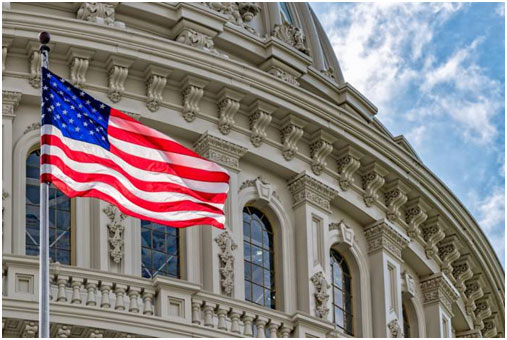
- Many lawyers pass on the idea of working for the government.
- One reason is the starting pay, which is nowhere near as much as what attorneys in private practices make.
- However, there are perks for working with the government that many attorneys may not know about.
- Keep reading to find out what those perks are.
In the summer of 2018, Milbank, Tweed, Hadley & McCloy LLP raised its first-year associate pay to $190,000 from the already impressive $180,000 amount. Soon, numerous other firms began to do the same. Law firms know that to attract and retain the best of the best they have to offer competitive rates, and this money factor is one reason many choose to go private instead of public after law school.
However, working for the government is also attractive to many talented individuals. While it is known that being a government attorney pays less than private, other perks make the job a viable option. The American Bar Association stated that 12% of the Class of 2017 went into government work after graduation, and that percentage was consistent with the previous graduating year. Working at a law firm or in Business & Industry were the only other employment categories that were more popular.
So if you are a law student considering your next steps, why should you consider a career working for the government? Why should you not? The following are some of the pros and cons of being a government attorney.
PRO: Rewarding work
People who choose the public sector over the private sector usually do so to answer a calling to serve. These individuals want to help society, and they have numerous ways to do that by being government attorneys. Examples of departments where they can work include the Securities and Exchange Commission, the Federal Trade Commission, the Federal Bureau of Investigations, the Department of Justice, and more. Government attorneys are not limited to federal work, either. There are plenty of jobs at the state and local level such as a county prosecutor or public defender.
"I think initially [what attracts attorneys to government work is] public service," says Paul Katzman, the assistant dean for career planning at the Marquette University Law School, told US News & World Report. "I think it’s the appeal of serving the greater good, giving back, making a contribution in a significant way."
Attorneys who work for the government immediately after law school are usually given more autonomy and responsibility than their private sector peers, many report. They also have the benefit of being able to grow in their departments for long periods of time or transition into other areas of government. Another option is moving into politics, where they have the opportunity to influence public policy.
CON: Less Pay
Ask any attorney what the biggest disadvantage to working for the government is, and they are most likely going to say the pay. That’s just going to be a given. For instance, a recent law school graduate who takes on a federal attorney job in Washington, DC could expect to make less than $65,000.
“Among attorneys working in civil legal services organizations, as public defenders or local prosecuting attorneys, or as attorneys in public interest organizations, those providing civil legal services have the lowest median entry-level salary, have the smallest increases in salary based on experience, and have seen the slowest growth in salary levels over the past 14 years,” the NALP Bulletin from June 2018 stated.
NALP, an organization for legal professionals, analyzed government attorney pay data, and it provided some salary statistics that are not commonly available.
“The median entry-level salary for a legal services attorney is $48,000; at 11-15 years of experience the median is $69,400. Pay for public defenders and local prosecuting attorneys is higher, with a median of $58,300 for entry-level public defenders and increasing to about $96,400 for those with 11-15 years of experience. For local prosecuting attorneys, the corresponding figures are $56,200 and $84, 400,” NALP said.
“Moreover, for the most part, salary medians for entry-level attorneys have increased by about $1,000 per year over the period, although that growth was sometimes stagnant in the period from 2008 to 2014, depending on the kind of organizations. For example, the median entry-level salary has increased from $34,000 to $48,000 at civil legal services organizations, though it barely budged from 2010 to 2012, while for local prosecuting attorneys the median increased from $40,000 to about $56,000, though the median was unchanged from 2010 to 2012,” NALP continued. “Entry-level salaries for public defenders increased the most from 2014 to 2018, from $50,400 to $58,300, or an average increase of about $2,000 per year from 2014 to 2018. Salaries in these organizations were basically flat from 2008 to 2010. Among more experienced civil legal services and local prosecuting attorneys, medians have increased by about $15,000 over the period 2004-2018. Again, public defenders have fared better; for example, the median has increased by $31,000 for those with 11-15 years of experience.”
See more
Consider Becoming a Government Attorney
Legal Jobs in Government
Government Attorney Job Description
PRO: Generous benefits
Government attorneys work as hard as private sector attorneys, and they sometimes put in the same amount of hours. While the paychecks are not similar, public work offers numerous other benefits that can offset the dollar difference.
“The federal government offers a broad array of benefits programs and family-friendly flexibilities that can greatly appeal to potential employees. Along with the usual offerings of health insurance, dental and vision insurance, and flexible spending accounts, the federal government provides some very enticing benefits that are not often as readily available in the private sector. Federal employees are entitled to at least 13 days of vacation leave as well as 13 days of sick leave each year. Depending on years of service, employees can earn up to 26 days of vacation leave each year. In addition, federal employees get 10 paid holidays each year,” ABA for Law Students wrote.
ABA for Law Students added that government lawyers may also be eligible for child and elder care, adoption incentives, part-time work, and flexible schedules. The flexible schedules come from a government policy that allows employees to compress their work hours to take one day off each pay period. This creates 26 three-day weekends per year.
CON: Entry-level jobs are hard to get
Once you are employed as a government attorney, you can navigate the system to move upwards and obtain high-level jobs such as a position in the federal cabinet or a judgeship. But getting that foot in the door is sometimes the hardest thing to achieve, but it can be done with careful planning and smart networking while you are in law school.
For instance, the two main hiring avenues for law students are honors programs or direct hiring. According to Lewis and Clark Law School, “[Honors programs] are highly competitive programs to recruit 3Ls, recent graduates, and judicial law clerks to work for a federal agency for at least 2 years, starting in the fall after graduating or finishing a judicial clerkship, and they typically lead to permanent positions.” Direct hiring refers to applying for jobs listed on government websites such as www.USAjobs.gov.
Many jobs are not listed online so law students interested in government work should go out and meet people to hear about these opportunities. They can talk to professors and ask for job leads or they can set up informational meetings with working public attorneys.
Another way to land an entry-level attorney position is to extern or intern. Many government agencies hold programs during the summer, and some externships are less competitive than the entry-level job application process.
PRO: Loan forgiveness
Law school graduates who choose to go into private practice or public service end up with the same amount of student loan debt no matter their choice. With that in mind, one may wonder—why should I become a government lawyer if it pays less? The answer to that is loan forgiveness. So what are some of the options available for government attorneys? The following is an abridged list of some of the most popular loan forgiveness options for public lawyers:
The Public Service Loan Forgiveness Program: Most government attorneys are eligible for student loan relief programs. The Public Service Loan Forgiveness Program is probably the most popular option. It allows workers with eligible employers to have their student loan debt wiped clean after making ten years of payments while employed. Candidates must work-full time and make all of their 120 payments to be eligible.
Attorney Student Loan Repayment Program: Lawyers who commit to working for the Department of Justice for three years are eligible for the Attorney Student Loan Repayment Program (ASLRP), which provides a maximum of $60,000 in assistance. To be eligible, DOJ employees must have at least $10,000 worth of federal student loan debt, and this includes Stafford loans, federal consolidation loans, Perkins loans, and supplemental loans. Chosen candidates can receive up to $6,000 in assistance a year for up to ten years.
John R. Justice Student Loan Repayment Program: Public defendants can receive up to $60,000 with the John R. Justice Student Loan Repayment Program. Eligible candidates can get up to $10,000 per year and must have worked as a public defender for at least three years. To apply, public defenders should look at the rules for their particular state.
Loan Repayment Assistance Programs (LRAPs): Many law schools offer programs to incentivize talented students into working in the public sector. To ease their graduates’ financial burden, participating schools offer loan repayment assistance programs. The amount varies depending on school and the salary requirement is usually that you earn less than $75,000 a year. For a comprehensive list, click here. States also offer similar programs with varying awards.
Government attorneys who make a certain income level are also eligible for income-based loan repayment plans. This means that your loan provider can work with you to set monthly payments based on your yearly salary.
PRO: Transferable skills
Attorneys who work for the government are seen as assets at law firms because they understand the way the system works and have generally developed a rolodex of valuable contacts. Harrison Barnes, the founder of BCG Attorney Search, a legal recruitment company, said that he has seen many public attorneys easily transition to the private sector.
“The path from public service to private practice actually occurs quite frequently,” Barnes said in his article How Difficult Is It Right Now to Transition from a Government Position to Private Practice? “In fact, many senior partners at law firms have had some experience as a government attorney. Some of the issues that private firms will consider are the transferability of your skills and the current public position that you hold. Many times the skills that a government attorney has acquired from experience on important cases will be the determining factor for firms to consider him or her. For example, an experienced federal prosecutor will have an easier time finding a job in a large law firm than a first-year public defender. That is not to say that only those attorneys in the loftiest government positions can transfer to the private sector, but they will certainly have an advantage in getting into the prestigious private firms.”
Barnes added that the transition can be made when a public attorney’s skills align with a private role. For instance, a federal prosecutor could work at a law firm as a top litigator.
Conclusion
Pay seems to be the most cited reason why law students choose to go private instead of public. Even though data from NALP shows that government attorney pay increases year to year, the amount is still significantly less than what a private attorney would pull in.
However, for many talented attorneys, the desire to serve one’s country, state, or city is more important than a paycheck. Working for the government gives some people a sense of pride that money cannot buy, and it also is generally a more stable job than that of an associate at a law firm.
Getting a government attorney job is not easy, but once in that role, there are various opportunities to move upwards or laterally to keep one’s career challenging and fresh. Working as a government attorney can also open the door to a successful career in politics. So for any law student considering public work, they can rest assured knowing that it is a meaningful pursuit.
Frequently Asked Questions (FAQ)
Q: What Is A Government Lawyer?
In almost every aspect of law (both domestically and internationally), government lawyers work at the federal, state, and local levels (for example, civil rights, environmental, tax, antitrust, labor, consumer protection, energy, banking, public international, administrative and criminal law, to name just a few). They practice types ranging from litigation to regulatory work to legislative drafting while representing their clients' interests. All of these experiences share a common bond: government lawyers represent, rather than act for, the interests of citizens and residents broadly, or the institutional interests of the government itself.
The judicial, legislative, and executive branches of government all employ lawyers. Lawyers in the executive branch work in the offices of the White House, state governors, and city mayors; the US Department of Justice in Washington (the government's legal office for both criminal and civil litigation), U.S. Attorney's Offices (the government's legal office for both criminal and civil litigation), state Attorney General’s Offices (each state’s legal office, including both criminal and civil work), District or State’s Attorney’s Offices (local criminal prosecutors), City Attorney’s Offices (representing cities in a variety of matters); public defenders’ offices; and in executive agencies of all kinds (for example, the U.S. Department of Treasury, the CIA, a state’s Department of Public Health, or a city’s Department of Urban Planning.). Those who work for the legislative branches are in the U.S. Congress, state legislatures, and city councils. In addition to serving as appointed or elected judges and law clerks, lawyers also work in all branches of the judicial system.
Q: What Are Government Lawyers Called?
Attorneys who work in government branches are called government attorneys. The jurisdiction in which government attorney works determines what types of legal issues they deal with. Because of this, they are designated differently based on the type of legal work they do. Here are a few of them:
Administrative Advocacy
Administrative/Management
Appellate Litigation
Civil Litigation
Enforcement
Factual Investigation
Individual Cases
Law Reform
Legal Writing
Legislative Work
Lobbying
Non-Legal
Policy
Regulatory Reform
Transactional
Q: What Is The Role Of A Government Lawyer?
Governing bodies make laws to protect the rights of citizens and to regulate society. The laws exist locally, state-wide, and federally, although people often misunderstand or disregard them. To enforce the law, the government uses attorneys. A government lawyer is one of these legal professionals.
Any lawyer who is directly employed by the government is a government lawyer. Their duties vary, and they are found at all levels. It's important to implement and enforce laws correctly regardless of the government agency a lawyer works for.
City attorneys may provide legal advice to city officials, enforce ordinances, and prosecute criminals. The laws they create also benefit local businesses and communities in general. Public defenders, enforcement of state law, and advice to government officials make upstate attorneys. Additionally, some represent the state as public defenders in criminal cases.
Federal government attorneys may draft regulations or offer assistance to various agencies. Among other responsibilities, he prepares opinions on criminal and civil matters pending in federal court. A legal review of agency decisions is also their responsibility.
An attorney with a government office will do different kinds of work as stated above. The work of a government lawyer generally includes the following:
Representing the government in court
Providing legal services that are in the interest of the public
Enforcing local and city ordinances
Providing assistance to other governmental agencies
Preparing legal opinions for matters pending before the court
Q: How Do You Become A Government Lawyer?
The licensing process varies by state based on whether an attorney is a private or governmental entity. The following educational steps must be completed by students wishing to become government lawyers:
Get a bachelor's degree.
Take the Law School Admissions Test (LSAT). Law schools in most cases will. take into account your LSAT scores before they admit you into law school.
Complete a JD (Juris Doctor) program.
Pass the bar exam in the state you want to practice in.
Q: How to Get A Job As A Government Attorney?
Taking the bar exam and meeting the educational requirements are both prerequisites for working as a government attorney.
See if any job openings are posted on the government's website. Also, you can use websites designed to help you find job openings near you.
Additionally, it is important to note that government employers look for specific personal qualities. Some of these include:
Commitment to public service
Previous experience in government, either through internships or clerkships
Writing skills
If you are at law school, it would be beneficial for you to look for a job there as a law clerk since most government agencies hire their law clerks.
Q: What Is The Average Salary For A Government Attorney?
According to your experience and the type of institution you work for, your salary will vary as a government employee. Based on the Bureau of Labor Statistics ("BLS"), an attorney makes $120,090 on average in 2019. This is closer to what a federal government lawyer might make. The average salary of prosecutors is around $65,000.
For more information, look into these articles:
- Pass the Bar in One State, Work in Another
- 25 Reasons Most Attorneys Hate the Practice of Law and Go Crazy (And What to Do About It)
- As An American Attorney, How Can I Find A Job Overseas?





